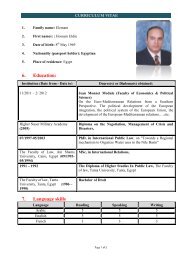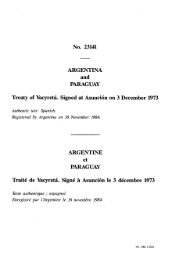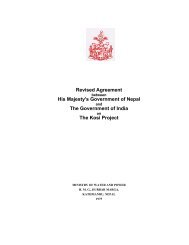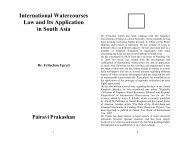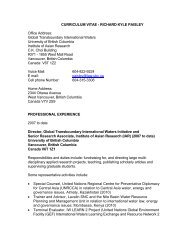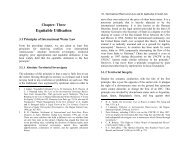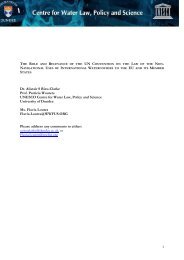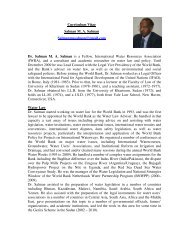Upreti, Trilochan, International Watercourses Law and Its Application ...
Upreti, Trilochan, International Watercourses Law and Its Application ...
Upreti, Trilochan, International Watercourses Law and Its Application ...
You also want an ePaper? Increase the reach of your titles
YUMPU automatically turns print PDFs into web optimized ePapers that Google loves.
202 / <strong>International</strong> <strong>Watercourses</strong> <strong>Law</strong> <strong>and</strong> <strong>Its</strong> <strong>Application</strong> in South Asia Prospects <strong>and</strong> Problems of Nepalese Water Resources / 203a multi-party democracy was restored in Nepal, followed by theinstallation of a new government, the two governments agreedto restore the status quo ante of April 1987 in matters of trade<strong>and</strong> transit. 67To analyse <strong>and</strong> evaluate Indo-Nepal relations, a study ofseveral treaty arrangements is essential, enabling anunderst<strong>and</strong>ing of the reality on the ground. There are threemajor bilateral instruments concluded by India <strong>and</strong> Nepal,supposedly to protect the former’s security concerns: the 1950Peace <strong>and</strong> Friendship Treaty, the 1965 Arms AssistanceAgreement, <strong>and</strong> the 1990 Joint Communiqué. The backgroundto the timing of the conclusion of each of these treaties isinteresting; on each occasion the Nepalese Government waseither in crisis or about to fall, or there was merely a caretakerGovernment in place. In principle <strong>and</strong> practice, suchgovernments do not normally have the right to conclude atreaty of this kind, that is to say one which is vital <strong>and</strong> has farreachingimplications. 68 It is considered that the conclusion ofeach of these treaties was carried out despite the fact that therewas no authority within the existing government, because inpractice such agreements had been concluded in the hope ofsecuring foreign support, either to remain in power or to winthe forthcoming election. However, the 1950 Treaty of Peace<strong>and</strong> Friendship, <strong>and</strong> the Exchange of Letters (on the same day),undermined Nepal's sovereignty <strong>and</strong> territorial integrity, statingthat the defence <strong>and</strong> security of Nepal would be dealt withjointly, <strong>and</strong> that arms <strong>and</strong> ammunitions should only be obtainedafter giving prior notice to India. 69 In regard to the economy<strong>and</strong> to commerce, each government was to treat citizens of theother country as their own nationals, allowing them toparticipate in the industrial <strong>and</strong> economic development of thecountry, by granting them, on a reciprocal basis, rights to67 Supra note 63, p. 221.68 Ibid. p. 222.69 Ibid. Article I of the treaty <strong>and</strong> paragraph 1 of the letter.property ownership <strong>and</strong> participation in trade <strong>and</strong> commerce,free movement, <strong>and</strong> other privileges of a similar nature. 70From several perspectives the treaty is defunct <strong>and</strong> outmoded,<strong>and</strong> Nepal has repeatedly requested its repeal <strong>and</strong> formulationof a new one. It is understood that both governments agreed todevise the new treaty, <strong>and</strong> the work is proceeding at foreignsecretary level; however, expected progress has not beenachieved <strong>and</strong> it is alleged that this is due to India. 71 The Indianposition about the 1950 treaty is that she insists on acontinuation of it, albeit with some modifications, if necessary,to accommodate Nepalese concerns. India claims that it wouldbe detrimental to Nepal if the special relationship with her wereto be ab<strong>and</strong>oned, as economic, trade <strong>and</strong> transit relations couldthereby be devastated. 72With regard to the 1990 Joint Communiqué, which restored thestatus quo ante of the earlier trade <strong>and</strong> transit arrangement,India succeeded in getting more concessions from a painstrickenNepalese government, such as the removal of the workpermit arrangements for Indian nationals working in Nepal,trade favours, the introduction of the concept of common riversapplying to water resources that belong to Nepal, theaccommodation of India’s security concerns, <strong>and</strong> so on. 73 Nepalwas equally responsible for agreeing to these provisions despitethe fact that restoration of the facility of access to <strong>and</strong> from thesea is a right under customary international law <strong>and</strong> no70 Articles VI <strong>and</strong> VII of the treaty.71 A. Mukariji, “Nepal is Destablization the Name of the Game?”,Ayanjit Sen (ed), India’s Neighbour: Problems <strong>and</strong> Prospects ,NewDelhi: Her-An<strong>and</strong> Pub., 2001, p. 116.72 K. Natawar Singh, “An Agenda for Talks with K. P Bhattarai” TheTimes of India, 7 June 1990.73 Supra note 63, pp. 230-232; also see S. P. Subedi, “The United Nations<strong>and</strong> the Trade Transit Problems of L<strong>and</strong>-Locked States” in M. IGlassener (ed), The United Nations at Work, Westport, CT: Praeger,1998, pp. 134-160.



